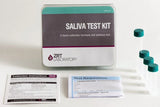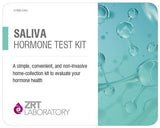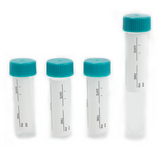The Hormone Acne Saliva Profile is a diagnostic test that measures the levels of four key hormones in the body to provide insights into the underlying hormonal imbalances that may contribute to acne. The four hormones measured in the Hormone Acne Saliva Profile are:
- Estradiol Hormone (E2): Estradiol is the primary form of estrogen in the body. In females, it plays a crucial role in regulating the menstrual cycle and promoting the development of secondary sexual characteristics. In males, it also has important functions, such as maintaining bone health and cardiovascular health. Imbalances in estradiol levels can contribute to acne development.
- Testosterone Hormone (T): Testosterone is the primary male sex hormone, but it is also present in females in smaller amounts. It plays a significant role in the development of male secondary sexual characteristics, such as facial hair and muscle mass. In both males and females, imbalances in testosterone levels can contribute to the development of acne.
- Progesterone Hormone (Pg): Progesterone is a hormone primarily involved in regulating the menstrual cycle and preparing the uterus for pregnancy. Imbalances in progesterone levels can contribute to hormonal acne in females, particularly during specific phases of the menstrual cycle.
- DHEAS (DS): DHEAS stands for dehydroepiandrosterone sulfate, which is a precursor hormone to testosterone and estrogen. It is produced by the adrenal glands and plays a role in regulating overall hormone balance in the body. Imbalances in DHEAS levels can impact the androgen levels in the body, which may contribute to acne.
By measuring the levels of these hormones through a saliva sample, the Hormone Acne Saliva Profile can help identify hormonal imbalances that may be contributing to acne development. This information can be useful in guiding healthcare professionals in determining appropriate treatment approaches for individuals with acne, including the use of hormone-regulating medications, lifestyle modifications, and other targeted interventions to address the underlying hormonal issues.
Key Features
- Saliva Hormone Testing: The test uses saliva samples to measure hormone levels. Saliva testing has several benefits, including ease of collection from the comfort of your home, non-invasiveness, and the ability to capture free, bioavailable hormone levels that are active in the body.
- Comprehensive Hormone Analysis: The test measures four essential hormones involved in acne development: Estradiol Hormone (E2), Testosterone Hormone (T), Progesterone Hormone (Pg), and DHEAS (DS). These hormone levels are presented in both graphical and numerical formats in the test result.
- Laboratory Comments by Hormone Specialist PhD: The test result includes comments and analysis from a Hormone Specialist PhD. The specialist provides insights into your hormone levels, their implications for acne, and recommendations for further action or treatment.
- Convenience and Privacy: The test kit allows you to collect samples from the comfort of your home, eliminating the need for a clinic visit. This provides convenience and privacy for individuals undergoing the test.
- Suitable for Adults and Children: The test is suitable for both adults and children, indicating its applicability to individuals of different age groups.
- No Additional Laboratory Cost: The test kit includes a laboratory fee, so there are no additional charges for the laboratory analysis. This ensures transparency and simplifies the testing process.
- Timely Results: After the laboratory receives your sample, you can expect to receive your test results within 3-5 working days. This provides prompt feedback on your hormone levels.
- Shelf Life: The test kit must be used within 12 months after the purchase date, ensuring the validity of the test.
- Shipping Responsibility: Customers are responsible for shipping their samples to the laboratory. This allows individuals to choose their preferred shipping method and ensures the timely arrival of samples for analysis.
- Click to see >> Saliva Sample Test Result Report
Overall, the Acne Profile Test offers a convenient and comprehensive approach to assessing hormonal imbalances related to acne. By providing hormone level analysis, expert commentary, and guidance on the next steps, the test aims to assist individuals in understanding their hormone profiles and devising appropriate treatment strategies.
This test is for those suffering from the below symptoms who want to find out precisely what is causing their hormonal acne to solve it.
Understanding Acne:
Acne manifests as pimples, blackheads, whiteheads, or cysts on the skin. It primarily affects the face, chest, back, and shoulders. Hormonal fluctuations, particularly during puberty, menstruation, pregnancy, and menopause, contribute to acne. Increased levels of androgens (such as testosterone) can stimulate the sebaceous glands, leading to excess oil production and clogged pores. Additionally, an overgrowth of bacteria on the skin, inflammation, and genetic factors also play a role in acne development.
Symptoms and Problems Associated with Acne:
- Skin blemishes: Acne can cause a range of blemishes, including Blackheads: Open comedones caused by blocked pores with oxidized sebum. Whiteheads: Closed comedones characterized by small, flesh-coloured bumps. Papules: Red, raised bumps that may be tender to touch. Pustules: Pimples filled with pus, often with a white or yellow centre. Nodules: Large, painful, solid lumps beneath the surface of the skin. Cysts: Painful, pus-filled lumps deep within the skin that can cause scarring.
- Scarring: In severe cases, acne lesions may leave behind scars, which can impact an individual's self-confidence and self-image.
- Emotional impact: Acne can significantly affect a person's emotional well-being. It may lead to embarrassment, social anxiety, depression, and a decreased quality of life.
- Persistent or recurring acne: Some individuals may experience persistent or recurrent acne well into adulthood, requiring long-term management strategies.
Testosterone hormone imbalance symptoms in men:
Testosterone hormone imbalance can affect both men and women, albeit with varying symptoms. Here are the symptoms commonly associated with testosterone imbalance inmen:
Symptoms of Testosterone Hormone Imbalance in Men:
- Decreased Libido: Men with low testosterone levels may experience a decrease in sexual desire or a diminished interest in sex.
- Decrease in Muscles / Few Distinctive Muscles: Testosterone plays a crucial role in maintaining muscle mass and strength. Men with low testosterone levels may notice a decrease in muscle mass or find it challenging to build and maintain muscle.
- Fat Deposits in the Stomach and Breast Areas: Testosterone imbalances can contribute to the accumulation of fat in the abdominal region, resulting in an increase in waist size. In some cases, it may also lead to the development of excess breast tissue (gynecomastia).
- Cellulite and Varicose Veins: Testosterone imbalance may affect the connective tissue in the skin, leading to the development of cellulite (dimpled skin) and an increased risk of varicose veins.
- Slack Arms and Face: Reduced muscle tone can result from low testosterone levels, leading to a loss of firmness and sagging in the arms and facial areas.
- Wrinkle Development: Testosterone deficiency may contribute to the development of wrinkles and fine lines on the face and other parts of the body.
- Dry Skin: Testosterone helps maintain healthy skin, and low levels can result in dryness and flakiness of the skin.
- Decreased Hair Growth: Testosterone is involved in regulating hair growth, and low testosterone levels can contribute to thinning hair, decreased body hair, and even facial hair loss.
- Low Stamina and Consistent Tiredness: Testosterone is associated with energy and stamina levels. Men with low testosterone may experience a decrease in overall energy, resulting in reduced stamina and persistent fatigue.
- Low Assertiveness, Uncertainty, and Decreased Stress Resistance: Testosterone plays a role in influencing mood and behaviour. Low levels can lead to decreased assertiveness, increased uncertainty, reduced stress resistance, and an overall change in mood.
- Nervousness, Anxiety, and Depressive Moods: Testosterone imbalances can impact mental well-being, leading to symptoms such as nervousness, anxiety, and even depressive moods.
- Forgetfulness: Some men with testosterone imbalance may experience difficulties with memory and concentration.
Male Estrogen / Progesterone deficiency symptoms:
Male estrogen/progesterone deficiency is relatively uncommon, as testosterone is the primary sex hormone in males. However, imbalances or deficiencies in estrogen and progesterone can still occur, leading to certain symptoms.
Symptoms of Male Estrogen/Progesterone Deficiency:
- Bone Loss: Estrogen plays a role in maintaining bone density in both men and women. A deficiency in estrogen can contribute to bone loss and increase the risk of osteoporosis in males.
- Depressed Mood: Hormonal imbalances, including low estrogen and progesterone, can affect mood regulation and contribute to feelings of depression or mood swings in males.
- Heart Palpitations: Fluctuations in estrogen and progesterone levels can impact the cardiovascular system, potentially leading to heart palpitations or irregular heartbeats.
- Hot Flashes: Although less common in men, estrogen deficiency can still lead to hot flashes, characterized by sudden sensations of intense heat and sweating.
- Neck or Back Pain: Some men with estrogen or progesterone deficiency may experience neck or back pain, which can be associated with changes in bone density and muscle function.
- Night Sweats: Similar to hot flashes, night sweats involve intense sweating during sleep, often accompanied by feelings of heat and discomfort.
- Sleeping Difficulties: Hormonal imbalances can disrupt sleep patterns and contribute to difficulties falling asleep or maintaining quality sleep.
Male Estrogen dominance / Progesterone deficiency symptoms:
Male estrogen dominance and progesterone deficiency are relatively uncommon conditions, as testosterone is the predominant hormone in males. However, imbalances or abnormalities in estrogen and progesterone levels can still occur, leading to certain symptoms. It's important to note that these symptoms are not exclusive to estrogen dominance or progesterone deficiency and can also be caused by other underlying factors.
Symptoms of Male Estrogen Dominance/Progesterone Deficiency:
- Cold Body Temperature: Estrogen dominance or progesterone deficiency may impact thermoregulation, leading to a perception of lower body temperature or difficulty maintaining body warmth.
- Irritability: Hormonal imbalances, including estrogen dominance, can contribute to mood swings and increased irritability in some men.
- Low Libido: Hormonal imbalances, including estrogen dominance or progesterone deficiency, can affect sexual desire and lead to a decrease in libido.
- Prostate Problems: Estrogen dominance in men can disrupt the balance between estrogen and testosterone, potentially contributing to prostate issues such as benign prostatic hyperplasia (BPH) or inflammation.
- Increased Urinary Urge: Hormonal imbalances can affect bladder function, leading to an increased urge to urinate.
- Decreased Urine Flow: Estrogen dominance may interfere with normal urinary function, leading to decreased urine flow or difficulties with urination.
- Breast or Hips Weight Gain: Estrogen dominance can lead to the accumulation of excess body fat, particularly in the breast area or hips, resulting in weight gain in these regions.
If you are experiencing any or a combination of those symptoms, it’s worth getting your hormone level imbalance checked using our Acne Comprehensive 4-panel hormone test.
Cause of Acne and Benefit of Acne Hormone Testing
Hormonal acne refers to acne that is influenced by hormonal fluctuations in the body, particularly an increase in androgens, such as testosterone. Androgens are hormones that are naturally present in both males and females, but they are typically more abundant in males. However, hormonal imbalances can occur in both sexes, leading to overproduction or sensitivity to androgens.
When androgen levels rise, they stimulate the sebaceous glands in the skin to produce more sebum, an oily substance that helps lubricate and protect the skin. However, excessive sebum production can lead to clogged pores and the development of acne. Additionally, androgens can increase the production of keratinocytes (skin cells) and promote inflammation, both of which can contribute to acne formation.
Hormone testing can be beneficial for the treatment of hormonal acne by providing insights into the specific hormonal imbalances that may be contributing to the condition. By measuring hormone levels, particularly testosterone and other relevant hormones, healthcare professionals can identify abnormal hormone patterns or imbalances. This information can help guide the selection of appropriate treatment strategies to address the root cause of hormonal acne.
Based on the hormone test results, healthcare professionals can develop personalised treatment plans. Here are a few examples of how hormone testing can benefit acne treatment:
- Targeted Medications: Hormone testing can help determine if hormonal imbalances are the primary cause of acne. In cases where androgen levels are elevated, medications that regulate hormones, such as oral contraceptives (for females) or anti-androgens, may be prescribed to reduce androgen activity and control acne.
- Lifestyle Modifications: Hormone testing can highlight underlying hormonal issues that may be exacerbated by certain lifestyle factors. For example, stress and inadequate sleep can disrupt hormone balance and contribute to acne. With hormone testing results, individuals can make targeted lifestyle changes, such as stress management techniques and optimising sleep, to support hormonal balance and improve acne symptoms.
- Dietary Adjustments: Hormone testing can provide insights into how diet may be affecting hormone levels. Certain foods, such as high-glycemic-index carbohydrates and dairy products, can influence hormone production and acne development. Test results can help individuals make informed dietary choices and potentially reduce acne-causing effects.
- Monitoring Treatment Progress: Hormone testing can be used to monitor the effectiveness of hormone-regulating treatments over time. By periodically retesting hormone levels, healthcare professionals can assess if the treatment is successfully restoring hormonal balance and reducing acne.
In summary, hormone testing is valuable for the treatment of hormonal acne as it allows for a personalized approach to address the underlying hormonal imbalances. By identifying specific hormone abnormalities, healthcare professionals can tailor treatment plans to regulate hormone levels and reduce acne symptoms effectively.
How to use:










